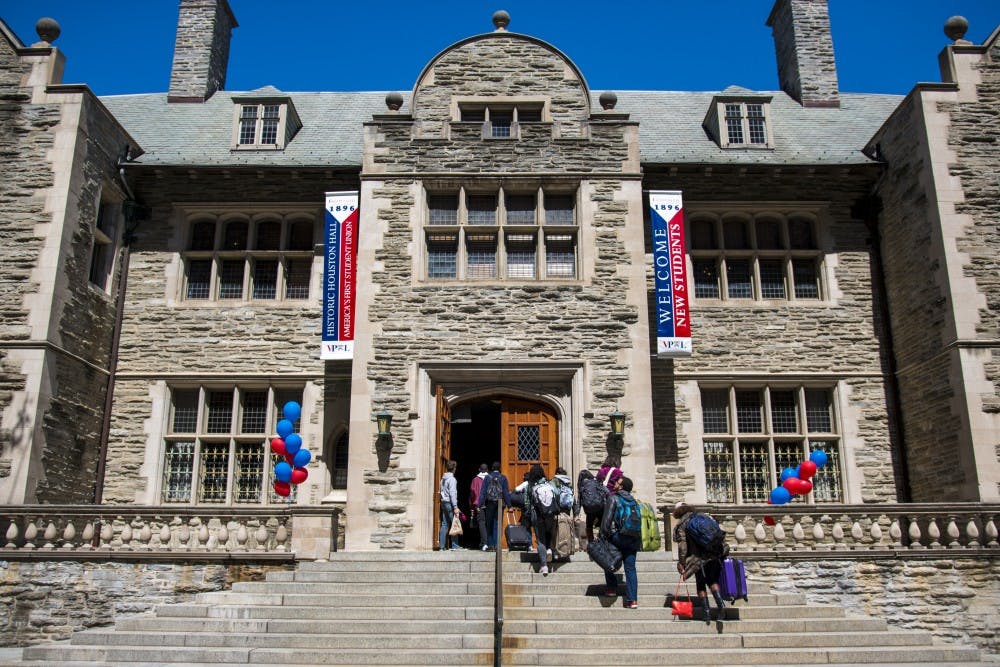
The third annual Quaker Days was held this week, enabling prospective students to explore Penn's campus and the city of Philadelphia.
Credit: Julio SosaBack for the third year in a row, Quaker Days has prospective students exploring Penn’s campus and beyond.
For the admissions office, these three days are the result of months, even years, of planning, as well as a large amount of money.
Yvonne Romero Da Silva, the vice dean and director of admissions for Penn, said that the most expensive costs for the programming come from room rentals for the events and food for the students.
“Room rentals are a big expense, so if we have to rent Irvine or Annenberg or different classrooms around campus, that’s an expense,” Romero Da Silva said. “Food is really expensive. But we feel it’s important that people feel welcome and included.”
Most of the money that funds the event comes from the Penn Admissions’ operating budget, used for recruitment and yield activities by Penn Admissions.
The bigger events throughout the program include “The First Hurrah,” an opening ceremony Monday afternoon at the Annenberg Center, and a tour of Philadelphia that ends at the Franklin Institute on Tuesday evening for “The Last Hurrah.”
Though The Last Hurrah is expensive, Romero Da Silva said she thinks it’s important both to allow the students to see the city of Philadelphia, and for the social aspect of the event at the Franklin Institute.
The Franklin Institute was a highlight for prospective students too, many citing the event as their favorite part of Quaker Days.
“The Franklin Institute was really fun,” Dhruv Sing, a prospective student, said. “We just got to hang out and get to know people. There are not too many times where all of us were in the same place, so it was cool just to meet a bunch of people.”
Not all of the money that goes into making Quaker Days possible comes from Penn Admissions’ budget.
For some prospective students who may not have the resources to come to campus for the programming, Penn is able to cover transport costs, which Romero Da Silva says is primarily due to donations from alumni.
“We do also have very generous alumni who have donated funds for us to make it possible, especially for students who come from lower income families to be able to visit Penn and experience Quaker Days,” Romero Da Silva said.
Local businesses and University departments also help make many of the events possible by donating or discounting their services for Quaker Days.
“We get lots of in-kind donations from across the University and across business services, that [they] themselves pitch in [to] either discount services for us, give them to us completely free, or host their own activities or receptions and such for the students who are here,” Romero Da Silva said.
Overall, Romero Da Silva said that Penn Admissions is conscious of how much money they are spending, and that they believe what they do spend is necessary to ensure a students have a good experience during Quaker Days.
“We really try to be as efficient as we can with the money as much as possible, without being too ostentatious, but also making sure that we have a nice event,” Romero Da Silva said. “So, we’re willing to pitch in for balloons and signs because our real number one priority is to make sure our students and families have a good time and a comfortable experience.”
And many prospective students seem to have had a positive experience during their visits. Fiona Bardhoshi, a Quaker Days attendee, said that what she took away from the programming was that everyone who was accepted into the Class of 2020 was chosen for a reason.
“Someone said, we admitted 3,600 of you; if one of you chooses to not go here, it’s going to mess up the whole vibe,” Bardoshi said. “So don’t break up the band.”
The Daily Pennsylvanian is an independent, student-run newspaper. Please consider making a donation to support the coverage that shapes the University. Your generosity ensures a future of strong journalism at Penn.
DonatePlease note All comments are eligible for publication in The Daily Pennsylvanian.








